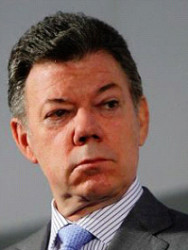BOGOTA (Reuters) – Colombia will have to raise taxes to fund its conflict with Marxist rebels if a possible peace deal falls through, President Juan Manuel Santos said yesterday, in comments roundly criticized by the opposition.
Santos, whose government began peace talks with the Revolutionary Armed Forces of Colombia, or FARC, in late 2012 in a bid to end more than 50 years of war, has come under fire over the last week for his comments on the peace process.

“It’s been said we’ll raise taxes to pay for peace, but it’s the opposite, if the war continues we’ll have to raise taxes to finance it – war is more expensive,” Santos said on public television.
Colombians will be asked to approve any peace deal agreed at the negotiating table in a referendum. Negotiators have said they are close to inking a final accord.
The country’s right-wing opposition, led by hardline ex-president and now senator Alvaro Uribe, has called for citizens to participate in a ‘civil resistance’ against the peace process, which he says will grant rebels impunity for human rights violations.
Uribe told journalists the tax comments were “an act of intimidation” aimed at scaring Colombians into voting for a peace deal in the eventual referendum.
Santos said last week that the FARC is prepared to return to the battlefield, especially in urban areas, if peace negotiations with the government fall apart, which opposition figures classed as fear-mongering.
Negotiators have reached partial accords on drug trafficking, rural reforms, ex-rebel participation in politics, finding disappeared people and removing landmines. Still, they are negotiating a bilateral ceasefire and how to implement the accords.
Santos has said a tax reform bill, considered vital to help the country cope with plunging oil revenues that have battered national income, will be approved by congress before the end of the year. The president also has said a peace deal could fuel economic growth of two per cent.




